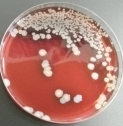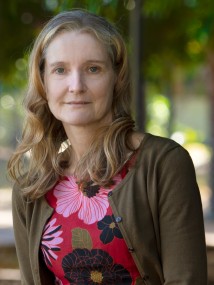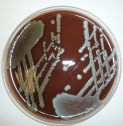Dr Deborah Holt
Honorary Senior Research Fellow, Global and Tropical Health Division
Qualifications:
PhD, University of Sydney, 2000; Bachelor of Applied Science, Royal Melbourne Institute of Technology, 1992; Graduate Diploma in Information Technology, University of Southern Queensland, 2009.
Approved level of HDR supervision at Charles Darwin University:
Principal Supervisor for PhD
Location:
Darwin - Royal Darwin Hospital campus
Biography:
Deborah Holt is an Honorary Senior Research Fellow at the Menzies School of Health Research and a Senior Lecturer in Biomedical Sciences at Charles Darwin University. She is a molecular biologist whose research focuses on the molecular epidemiology and pathogenesis of parasitic and bacterial pathogens of significance in Indigenous communities in northern Australia and tropical regions of the world.
Research Themes
- Holt, D.C., Harris, T.M., Hughes, J.T., Lilliebridge, R., Croker, D., Graham, S., Hall, H., Tong, S.Y., Giffard, P.M. Longitudinal whole-genome based comparison of carriage and infection associated Staphylococcus aureus in northern Australian dialysis clients. PLoS One, 2021. 16(2): e0245790.
- Holt, D.C., Andersson, P., Buckley, C., Whiley, D.M., and Giffard, P.M., Identification and Discrimination of Chlamydia trachomatis Ocular and Urogenital Strains and Major Phylogenetic Lineages by CtGEM Typing, A Double-Locus Genotyping Method. Methods Mol Biol, 2019. 2042: p. 87-122.
- Giffard, P.M., Andersson, P., Wilson, J., Buckley, C., Lilliebridge, R., Harris, T.M., Kleinecke, M., O'Grady, K.F., Huston, W.M., Lambert, S.B., Whiley, D.M., and Holt, D.C., CtGEM typing: Discrimination of Chlamydia trachomatis ocular and urogenital strains and major evolutionary lineages by high resolution melting analysis of two amplified DNA fragments. PLoS One, 2018. 13(4): p. e0195454.
- Holt, D.C., Shield, J., Harris, T.M., Mounsey, K.E., Aland, K., McCarthy, J.S., Currie, B.J., and Kearns, T.M., Soil-Transmitted Helminths in Children in a Remote Aboriginal Community in the Northern Territory: Hookworm is Rare but Strongyloides stercoralis and Trichuris trichiura Persist. Trop Med Infect Dis, 2017. 2(4).
- Giffard, P.M., Su, J.Y., Andersson, P., and Holt, D.C., Primary health clinic toilet/bathroom surface swab sampling can indicate community profile of sexually transmitted infections. PeerJ, 2017. 5: p. e3487.
- Mofiz, E., Holt, D.C., Seemann, T., Currie, B.J., Fischer, K., and Papenfuss, A.T., Genomic resources and draft assemblies of the human and porcine varieties of scabies mites, Sarcoptes scabiei var. hominis and var. suis. Gigascience, 2016. 5(1): p. 23.
- Holt, D.C. and Fischer, K., Novel insights into an old disease: recent developments in scabies mite biology. Curr Opin Infect Dis, 2013. 26(2): p. 110-5.
- Holt, D.C., Burgess, S.T., Reynolds, S.L., Mahmood, W., and Fischer, K., Intestinal proteases of free-living and parasitic astigmatid mites. Cell Tissue Res, 2013. 351(2): p. 339-352.
- Holt, D.C., Holden, M.T., Tong, S.Y., Castillo-Ramirez, S., Clarke, L., Quail, M.A., Currie, B.J., Parkhill, J., Bentley, S.D., Feil, E.J., and Giffard, P.M., A very early-branching Staphylococcus aureus lineage lacking the carotenoid pigment staphyloxanthin. Genome Biol Evol, 2011. 3: p. 881-95.
- Lilliebridge, R.A., Tong, S.Y., Giffard, P.M., and Holt, D.C., The utility of high-resolution melting analysis of SNP nucleated PCR amplicons--an MLST based Staphylococcus aureus typing scheme. PLoS One, 2011. 6(6): p. e19749.
Click here to view more Deborah Holt publications in PubMed.
-

Love affair with parasites
From scabies to flesh-eating fire fish (okay we made that one up), Dr Deborah Holt knows, and loves, parasites. We find out why.
-

Researchers discover a new silver species of Staphylococcus
Scientists from a pioneering Northern Territory-based research project have uncovered two new species of staphylococcus. One of the two has been officially registered as Staphylococcus argenteus, or more commonly Silver Staph.
-
‘Golden staph’ three species, not one
'Stories of Australian Science' magazine
-

Pain free golden staph treatment cleared for use in remote communities
A northern Australian research team has provided reassuring support for the continued use of an oral treatment option for patients with skin infections, finding that there has been inaccurate reporting of resistance to the recommended antibiotic.


